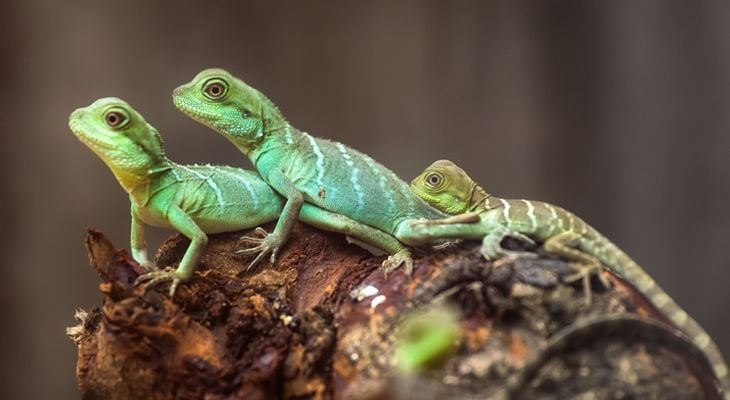People love sweets and so do many dogs. In fact, some dogs love their family's sweet treats and sneak bites of it when the humans aren't looking. You or your children probably also share goodies with your family pet. Many sweets are made with the substance called xylitol. Xylitol is used to manufacture
Read more

People with limited living quarters may find that reptiles such as lizards or turtles fit perfectly into their lifestyles. Before deciding on a reptile, learn as much as possible about them and their needs. Poisonous snakes and certain reptiles should never be kept as pets. Ask your veterinarian about the suitability of a particular animal before you make your decision. There are many things to consider before committing to a reptile as a pet.
Finding out if a Pet is Legal Where You Live
Many areas have enacted laws pertaining to keeping reptiles. Some are general and some are quite specific; in many places any reptiles that are considered dangerous (venomous snakes, alligators, etc.) are illegal but some places are even more restrictive (for example, in some states all constricting snakes including ball pythons are illegal).
Salmonella Risks and Prevention
All reptile owners need to be informed about Salmonella infections. While the risks shouldn't keep most people from keeping reptiles since with the proper management the risks are minimal. Still, owners should be aware of the risks, and the US Centers for Disease Control recommends that certain risk groups should be careful about contact with reptiles and amphibians.
The Importance of Light and Heat
Many problems with keeping reptiles can be traced back to not providing the proper environmental conditions, particularly heat. Proper lighting is also important for many reptiles. The equipment to provide the proper heat and light to captive reptiles is often quite expensive, but is absolutely essential to keeping pet reptiles healthy. It is important to find out exactly what conditions your reptile needs and never cut corners when it comes to meeting those conditions!
Why Choose Captive Bred Reptiles
There are numerous reasons why you should pick a captive bred reptile if at all possible, as explained here.
How to Pick a Healthy Reptile
It is important to keep in mind that depending on where you get a reptile, it may be very stressed, dehydrated, and prone to illness. Here are some items to look for when buying your reptile to increase the chances of picking out a healthy pet reptile.
While there are many types of reptiles that could be good pets, here we cover a few you could consider.
-
Xylitol Food Additive Harmful to Household Pets
Category: Newsletter Library, Pet Dangers
-
The Truth behind K-9's and Chocolate
Category: Newsletter Library, Pet Dangers
We have all heard people say things such as "Don't give your dog chocolate, it will kill him!" or "Even a small amount of chocolate will kill a dog." Fortunately for all cabinet opening dogs out there, the truth to the chocolate rumors lies somewhere between the chilling truth in the refrigerator and
Read more -
Rabies- Not a Disease of the Past
Category: Newsletter Library, Pet Dangers
Did you ever think that your pet's rabies vaccination wasn't all that important? Did you know that if your cat or dog is not current on its rabies vaccination, and a stray or wild animal bites your pet, the County Health Department can, and will, demand that the pet be euthanized or strictly quarantined
Read more -
Pretty Poisonous Plants
Category: Newsletter Library, Pet Dangers
We all enjoy flowers, whether in a vase in our house or in our gardens. We enjoy the multitude of bright colors and the fragrant odor they give us. But there can be a dangerous aspect to some of our favorite plants. The list of poisonous plants is very long, but this will give you information about some
Read more -
Plants That Are Poisonous to Pets
Category: Newsletter Library, Pet Dangers
Pets are incredibly curious creatures who are not above snacking on anything that interests them. When that snack is a plant, problems can occur. Many plants are poisonous if eaten and can cause symptoms ranging from mild discomfort to death. Below is a list of some of the most common plants that sicken
Read more -
Marijuana Toxicity in Pets
Category: Newsletter Library, Pet Dangers
Imagine your concern if you came home to find your dog unable to walk, unresponsive, or in a coma. This is becoming more common as marijuana begins to lose its illicit status, at least in some areas of the world. As the decriminalization and even legalization of marijuana has occurred, cases of toxicity
Read more -
Make Your House Pet Friendly
Category: Newsletter Library, Pet Dangers
Keeping your house pet friendly is critical to the health and wellness of your pets. Just what does pet friendly mean? A pet friendly house is a sheltered location for an animal to live, play and relax that is clean, safe, free from hazards and toxic materials. Most pets share house space with their
Read more -
Keeping Pets Safe from Being Lost
Category: Newsletter Library, Pet Dangers
An estimated one third of all pets will become lost at some point in their life. Reasons for pets becoming lost include everything from a loose gate to breaking free from a leash. With so many possible ways for a pet to become lost, it is important to follow some simple safety procedures. Dog Tags (Identification
Read more -
Hidden Dangers of Over-the-Counter Medications
Category: Newsletter Library, Pet Dangers
There are many medications available over the counter (OTC) at pharmacies and grocery stores that we consider to be safe, their use to be routine. We don’t think twice about picking up medications to help with pain or flu symptoms. What many people don’t consider is that these same medications can
Read more -
Dangers of Rodent Bait
Category: Newsletter Library, Pet Dangers
There are several general classifications of rodent poison (rodenticide) available over the counter. The most common is one that prevents blood clotting called an anticoagulant; D- con being the most easily recognized in light of the recent bans on second generation anticoagulant rodenticides. Anticoagulant
Read more -
Can PBDEs Harm Your Pet?
Category: Newsletter Library, Pet Dangers
The Environmental Protection Agency indicates that polybrominated diphenyl ethers (PBDEs) have a negative impact on your health and environment. These chemicals in your home environment may be causing harm to your pet without your knowledge. In the body, PBDEs are found in breast milk, blood and the
Read more -
Calcium is Not Always Good
Category: Newsletter Library, Pet Dangers
When examining a blood panel, a veterinarian may report to the owner that a pet has hypercalcemia, which is an elevated level of calcium in the blood. The owner often then wonders if there is too much calcium in the pet's food or in the vitamins or supplements the pet is taking. Ingesting calcium in
Read more -
At Risk for Rat Bite Fever?
Category: Newsletter Library, Pet Dangers
Rats have made numerous appearances on the screen and the page as you've watched theater movies with your children, read popular children's books or relaxed while checking out family films with your home's technology system. Movies have made the rodents popular in the world of children. Popular children's
Read more -
The Most Expensive Dog Breeds
Category: Newsletter Library, Recognizing Illness
It is well known that each breed of dog tends to have certain health problems more common to that breed. This is probably due to genetics. As canine DNA is studied, it is hoped that we can eventually develop genetic tests for early detection and possible prevention of these diseases. In the meantime,
Read more -
Fatal Rabies Disease is Preventable
Category: Newsletter Library, Recognizing Illness
Pets need to be vaccinated to prevent against rabies. Rabies is a fatal viral zoonosis and veterinarians believe that all mammals are susceptible to it. This disease puts the public at risk and prevention measures are urged. Rabies is transmitted through saliva. It enters the body of person or pet through
Read more -
Chronic Pain in Pets
Category: Newsletter Library, Recognizing Illness
It's hard to see your pet in pain day after day, particularly if your formerly energetic friend has now become lethargic and withdrawn due to a health condition or disease. Unfortunately, pets suffer from chronic pain just like people do. Learning about types of chronic pain and treatments can help you keep your pet more comfortable.
Read more
Location
Find us on the map
Burlingame Veterinary Clinic
8511 SW Terwilliger Blvd.
Portland, OR, United States

